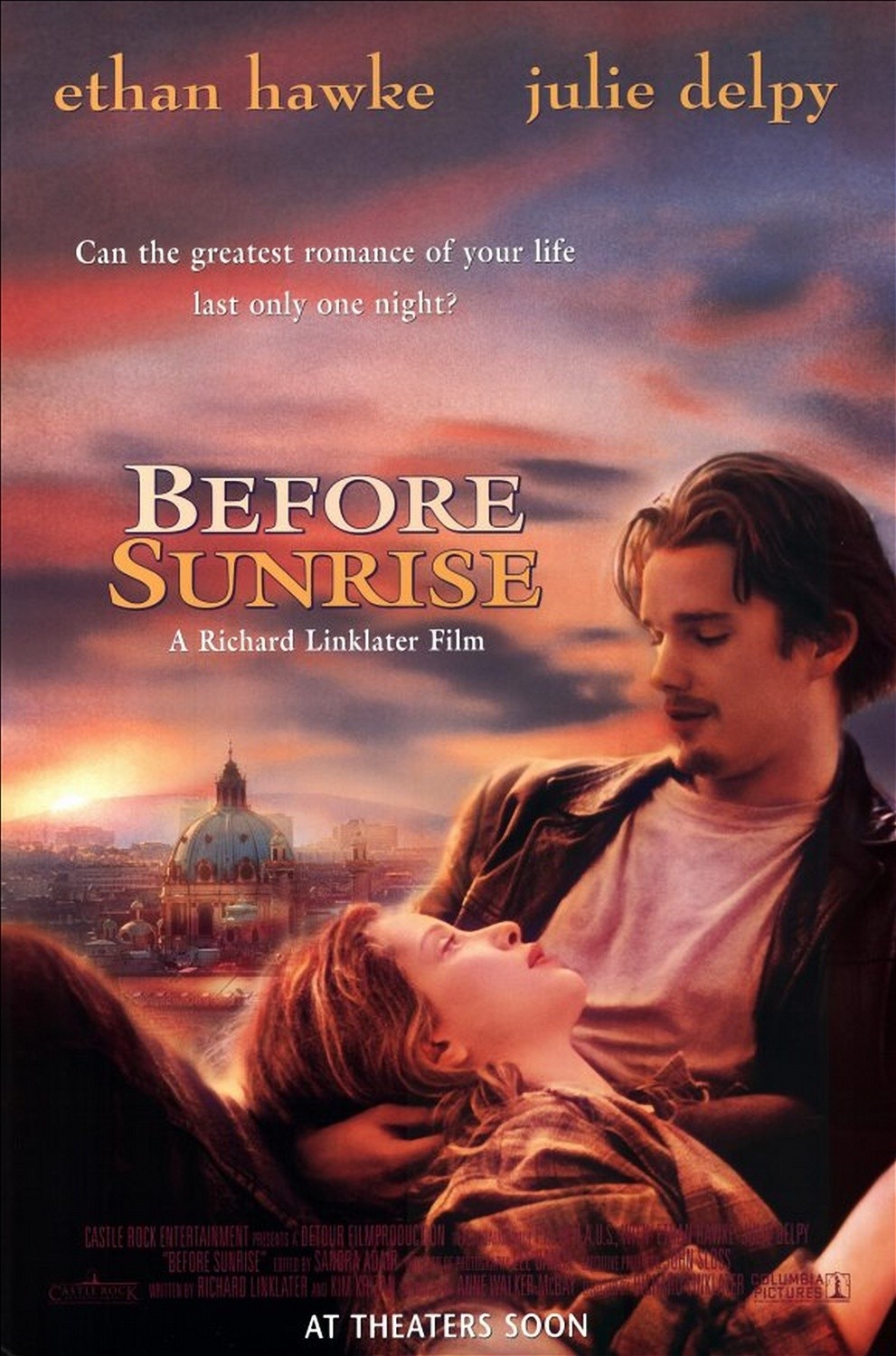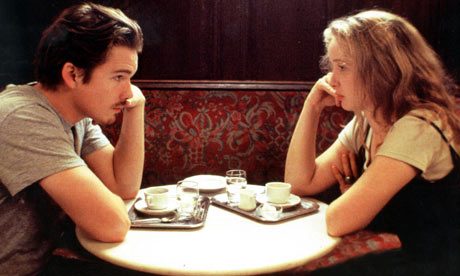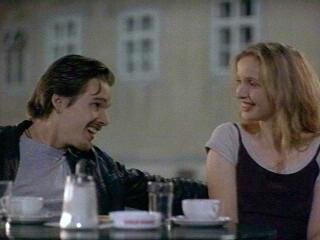

Director: Richard Linklater, 1995 (R)
Two young people meet on a train, spend a day walking around a beautiful European city, talking to each other about various topics, slowly falling in love until they part before sunrise. On paper, this sounds blah and boring. But under the skillful hands of Richard Linklater, who also wrote the screenplay, this independent film, lowly in concept, has become the first chapter of perhaps the most important cinematic love story of all time. It’s truly magical and engaging as few American films are. It seems almost akin to a foreign film in this respect.
Travelling from Budapest to Vienna, American tourist Jesse
(Ethan Hawke) meets by chance Celine (Julie Delpy), a French grad student en
route back to La Sorbonne in Paris. When they strike up a conversation, the
chemistry is evident, and they proceed to the restaurant car to continue their
discussion. On a crazy whim, arriving in Vienna Jesse suggests Celine get off
and spend the day with him walking the streets. He has no money but a day to
burn in this city before flying back to the States. They could enjoy each
other’s company until he has to depart for the airport, almost a day later.
Surprisingly, she agrees and so begins a wonderful journey.
Both in their early twenties, these two will talk about
topics that span the spectrum from childhood to death, parents, boyfriends,
girlfriends, music, reincarnation and love, especially love. Indeed, they offer
two perspectives on love. Jesse comes at it from a cynicism that seems too
mature for his age, while Celine is a classic romantic.
Linklater shows them walking around together, with the
camera either walking and facing them or showing their backs. Either way, the
takes are long, very long, and the dialog is rings so true it seems that we
could recall similar conversations in our own past. It is testimony to the
quality of the script, as well as the actors who deliver the lines, that
despite the moving seeming to move in ordinary time, it sweeps us along like a
rushing river. We care for this couple, even when we don’t know where they are
going.
Perhaps the veracity comes from the fact that Linklater
based this on a personal experience he had when he was younger. He met a woman,
Amy, and spent a night walking around Philadelphia with her until they parted
ways the next day. Certainly Vienna is a better location than Philadelphia and
casting a French woman adds an element of mystery.
Despite the fact that there are virtually no other known
actors in the film and 90% of it is spent with dialogue between Jesse and
Celine, there are a couple of other individuals who show up briefly in key
scenes. Indeed, there are a number of fantastic scenes.
 The opening scene in the train, of course, sets the tone. It
will be a talking show. Then there is a scene in a café where each pretends to
phone a friend to recount the romance of this meeting. It is an excellent way
for each of them to share with the other what they are feeling, becoming
vulnerable while retaining a certain level of separation and protection.
The opening scene in the train, of course, sets the tone. It
will be a talking show. Then there is a scene in a café where each pretends to
phone a friend to recount the romance of this meeting. It is an excellent way
for each of them to share with the other what they are feeling, becoming
vulnerable while retaining a certain level of separation and protection.
Early discussion eventually comes round to relationship.
Celine has the romantic ideal of finding someone, but Jesse seems to be more
focused on tasks. He says: “It’s just that, if I’m totally honest with myself I
think I’d rather die knowing that I was really good at something. That I had
excelled in some way than that I’d just been in a nice, caring relationship.”
It’s as though he has been hurt so much he wants to protect himself.
It’s been said that men are task-oriented in early years, as
ambition and drive propel them forward into careers, to conquer the world.
While at the same time women are relational in these years. Certainly,
Linklater echoes this here, but it is more than stereotype. It is a glimpse
into two people who are reflecting on their upbringing: one has been damaged by
divorce; the other has been nurtured and is now flying free.
A turning point occurs when they encounter a fortune teller
who walks up to a table where they are sitting at an outdoor piazza. When she
reads Celine’s palm, Celine gushes with appreciation. But Jesse reacts with a
cynicism that borders on hostile. Two samples of dialogue illustrate Jesse’s
cynical approach to love compared to Celine’s romantic view. At one point, he
says: “I kind of see all love as this, escape for two people who don’t know how
to be alone. People always talk about how love is this totally unselfish,
giving thing, but if you think about it, there’s nothing more selfish.”
Of course, Jesse’s view contradicts the biblical perspective.
We are indeed selfish, in our old nature, according to many Scriptures (Phil.
2:3; Jas. 3:14). But true love, a love that is rooted in God and his very nature
(1 Jn. 4:16), is fundamentally not selfish. Perhaps the most famous passage on
love in the Bible is found in 1 Corinthians 13:4-8. It says:
Love is patient, love is kind. It does not envy, it does not boast, it is not proud. It does not dishonor others, it is not self-seeking, it is not easily angered, it keeps no record of wrongs. Love does not delight in evil but rejoices with the truth. It always protects, always trusts, always hopes, always perseveres. Love never fails.
Love is not simply an escape. Love
is a journey and an end point.
Celine, in a contrasting opinion on love, picks up this
thread and comments: “But loving someone, and being loved means so much to me.
We always make fun of it and stuff. But isn’t everything we do in life a way to
be loved more?” Love is central to human experience. God made us with a desire
to love and be loved. We find Adam standing alone in the garden (Gen.2) because
he has no one to love. God gave him a partner to satisfy this need. And of
course, we have an innate emptiness where our love for God could and should be.
Another terrific scene occurs as the two come across a
street poet sitting by the river’s edge. Offering to create a poem for them, he
writes:
You have no idea where I come from
We have no idea where we’re going
Lodged in life
Like branches in a river
Flowing downstream
Caught in the current
I carry you
You’ll carry me
That’s how it could be
Don’t you know me?
Don’t you know me by now?
This captures perfectly the moment for them. They are
flowing along, not knowing where they have come from or where they are going.
Neither really knows the other, yet their conversation has carried them along
way along the path of mutual knowledge. But Celine springboards off this point:
“When you talked earlier about after a few years how a couple would begin to hate each other by anticipating their reactions or getting tired of their mannerisms-I think it would be the opposite for me. I think I can really fall in love when I know everything about someone-the way he's going to part his hair, which shirt he's going to wear that day, knowing the exact story he'd tell in a given situation. I'm sure that's when I know I'm really in love.”
Celine sums up one essence of love: total self-giving
through total self-revelation. It will take a life-time of relationship to
fully make ourselves known. It cannot occur in one night or even one year. But
knowledge leads to love and complete knowledge brings love to completion.
Knowledge also leads to life. This scene and dialogue
reminds us of Jesus words to his disciples in the Upper Room Discourse: “Now
this is eternal life: that they know you, the only true God, and Jesus Christ,
whom you have sent” (Jn. 17:3). Life is knowing God. And conversely, knowing
God imparts true life. With that true life, comes the true love that was
mentioned in the quote above.
When Before Sunrise came out, no one knew it was merely the
beginning. It is now seen as the opening chapter in a trilogy that is unique in
its longevity and brevity of characters. But it is one that once seen will not
be forgotten.
The film ends on an ambiguous note, one that can be
interpreted either cynically or romantically. It is up to us to decide.
Copyright ©2013, Martin Baggs



No comments:
Post a Comment